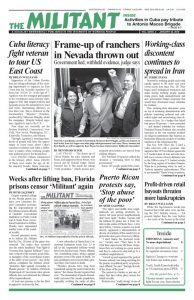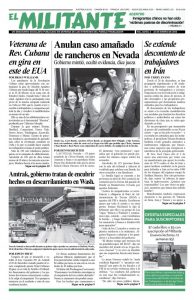For the first time since 2015, representatives of the North and South Korean governments met at the border village of Panmunjom Jan. 9, and “agreed to actively collaborate for the success” of the Winter Olympics taking place in South Korea in February, a joint press statement said.
Pyongyang agreed to send a sizable delegation, including athletes, cheerleaders, a cultural performance troupe and taekwondo demonstration team, along with high-level government officials.
“Officials in Seoul said they would consider temporarily lifting sanctions on certain officials” from North Korea, the Financial Times reported, “to allow the delegation to legally enter South Korea.”
The meeting was facilitated by the announcement from Seoul and the U.S. government that they had agreed to “postpone” yearly military exercises — named Foal Eagle and Key Resolve — that involve up to a quarter million troops in provocative practice runs for invading the North to “detect, defend, disrupt and destroy” military facilities there.
As part of announcing this decision, a White House statement said that President Donald Trump promised to send a substantial delegation to the Olympics, including members of his family.
Seoul reported the two Korean delegations discussed having their representatives march together in the Games’ opening ceremony. Further meetings to work out logistics, including how the North Korean delegation will come through the demilitarized zone dividing the country, are in the works.
Officials also agreed to hold military talks to reduce tensions, the two governments said in their joint statement, and to “facilitate contact, exchange and cooperation in diverse fields.”
A cross-border telephone hotline at the demilitarized zone was reopened Jan. 3 for the first time in 23 months. The majority of South Koreans support the moves, including Seoul covering travel expenses for the North Korean athletes and cheerleaders, the Korea Herald reported.
“Talks are a good thing!” tweeted Donald Trump Jan. 4. A couple days later he told reporters that he would “absolutely” be willing to talk on the phone with Kim Jong Un if circumstances were right.
While admitting that he has some differences with Washington, South Korean President Moon Jae-in Jan. 10 gave credit to the U.S. president and the “U.S.-led sanctions and pressure” for helping spark the talks with the North. The State Department said the U.S. would be interested in joining future talks, with the aim of denuclearizing the North.
Harsh sanctions imposed on NKorea
These developments occur as Washington has pushed through the U.N. Security Council ever stiffer sanctions against the Democratic People’s Republic of Korea for its nuclear weapons and intercontinental missile programs. These economic attacks — which include banning DPRK exports of coal and sea products and curtailing employment of North Korean workers abroad — hit working people the hardest.
Washington has also been keeping up pressure on Beijing to cut trade with Pyongyang, the vast majority of whose trade is with China. While welcoming the joint Korean talks, Beijing continues to implement the U.N. sanctions it joined Washington in voting for.
The roots of the conflict go back 70 years when Washington, with agreement from Moscow, divided the Korean Peninsula. U.S. troops occupied southern Korea and installed the puppet regime of Syngman Rhee, crushing widespread revolutionary struggles in 1948.
After revolutionary mobilizations in the north led to the establishment of an independent government, U.S. troops invaded in 1950. As they neared the Chinese border, Beijing sent its army to join the North Koreans in repelling Washington’s advance. During the course of the war more than 4 million people were killed, including at least 2 million civilians. U.S. bombing flattened Pyongyang and other cities in the North. A cease-fire was signed in 1953, but the U.S. rulers to this day refuse to sign a peace treaty with the DPRK.
Since 1948 the Socialist Workers Party has campaigned for the withdrawal of U.S. troops from the peninsula; for the fight of Korean workers and farmers for one, united Korea; and for a nuclear-free Korean Peninsula and Pacific.

